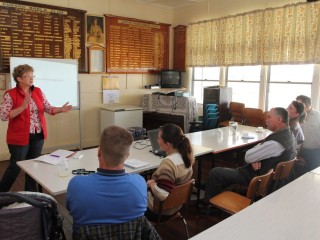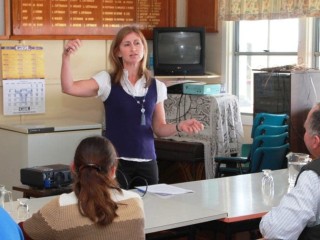 If Meat and Livestock Australia’s recent Meat Profit Day at Eidsvold helped to ignite the fires of “agvocacy” in rural Australia, a new series of workshops promises to fan the flames.
If Meat and Livestock Australia’s recent Meat Profit Day at Eidsvold helped to ignite the fires of “agvocacy” in rural Australia, a new series of workshops promises to fan the flames.
MLA and AgForce conducted a pilot agvocacy workshop in the southern Queensland town of Durong last Friday, the first of what is likely to be many similar workshops around Australia in coming months.
An expert panel of speakers, comprising pioneering US farm advocate Trent Loos, local beef farmer and rural communicator Georgie Somerset, AgForce media manager and former ABC rural radio journalist Jane Paterson and MLA online editor Matthew Dwyer, provided relevant and practical insights into why farmers need to speak out, how they can do it and what they can talk about.
“Agvocacy” refers to agricultural advocacy, or the practice of farmers proactively communicating with consumers and the media to promote the importance of agriculture and to counter the spread of false information.
Agvocacy can take various forms, such as engaging in one-on-one conversations or speaking to groups, promoting agriculture through the media, and using online and social media tools such as blogs, Twitter and Facebook to share stories and to make connections with consumers.
Communities of agricultural advocates are already growing in Australia, with one notable example being the “agchatoz” (#AgChatOz) network on Twitter, which encourages anyone with an interest in agriculture to chat and share information and to engage in regular group discussions about issues of importance every Tuesday night. The sessions regularly attract city based Tweeters who tune in to converse with the ag community and to ask questions about how and where their food is produced.
The local agvocacy movement also gained significant traction in June when Meat and Livestock Australia flew prominent US agvocates Troy and Stacy Hadrick to Australia to address more than 500 farmers at the Eidsvold Meat Profit Day.
A new wave of rural bloggers, tweeters and Facebook devotees emerged in the wake of their presentation, and a widely-watched ABC Landline program that followed, with many citing the Hadrick’s inspirational message as providing the impetus for their decision to engage.
But while the agvocacy movement is growing, most Australian farmers and ag industry participants remain silent in the face of mounting public campaigns against their indusrtry.
And while negative attacks on farming go unchallenged, animal rights and environmental groups and their wide networks of active supporters continue to campaign collectively to influence community perceptions against animal agriculture.
They understand which buttons to push to attract media and public attention to their cause, and they routinely succeed in portraying isolated examples of bad practice as representative of entire industries.
Most surveys show that the public still holds farmers in high esteem, but the danger is that as anti-farming campaigns intensify, that can change. Confronted with emotively-charged, negative statements about agriculture, consumers with little to no first-hand experience of farming or direct connection with farmers against which to check the validity of anti-farming claims, may be increasingly inclined to believe them.
A telling message at Durong last Friday was the extent to which relentless attacks on farming are also weighing upon the psyche of farmers, and playing on their reluctance to speak out.
Mundubbera cattle farmer and 2011 Eidsvold Meat Profit Day committee chair Kara Knudsen said farmers were constantly being bombarded with messages that they were not doing the right thing.
“As a person growing up in the industry, I remember my father being very proud of what he produced and his cattle, and showing people what we do,” Kara said.
“Now we worry that if people come on there, what are they going to say, where are they going to get us.
“Our attitude has changed, but we have got to turn around and say we’re food producers, we’re proud of what we do, we don’t do anything wrong. We ourselves have got to get some self-esteem going and realise that what we do is not bad.”
And in that point lay the key message at last Friday’s forum – most people still support farmers and want to hear from them – the challenge is for farmers to realise that and be brave enough to stand up and tell their stories.
 Beef farmer and rural communicator Georgie Somerset, an active rural advocate since 1985, said extensive MLA research confirmed that most consumers viewed farmers as trustworthy people who looked after the environment and grew a safe and quality product.
Beef farmer and rural communicator Georgie Somerset, an active rural advocate since 1985, said extensive MLA research confirmed that most consumers viewed farmers as trustworthy people who looked after the environment and grew a safe and quality product.
“The perception we keep pursuing in rural Australia that urban people hate us is actually wrong,” she said.
Farmers were experts in their own operations, and the best person to be tell their stories was farmers themselves.
1000 people telling one story was far more powerful than one person telling 1000 stories, she said.
Sixth generation Nebraska rancher Trent Loos is a leader of the agvocacy movement in the US and has helped to mentor other prominent agvocates such as the Hadricks. He told farmers at Durong that anti-meat groups bank on livestock producers feeling too intimidated to stand up and defend their industry in public.
He said everyone in agriculture should have the confidence to talk about what they do and why they do it. He urged farmers to make time for agvocacy by adding it to their list of daily chores.
Just as animal and environmental activists knew how to hit the right buttons of city populations, farmers had to do the same thing in trying to connect with urban consumers.
 AgForce media manager Jane Paterson advised farmers to put themselves in the shoes of urban residents and to seek to understand the hardships they face when communicating with them.
AgForce media manager Jane Paterson advised farmers to put themselves in the shoes of urban residents and to seek to understand the hardships they face when communicating with them.
From a journalist’s perspective, she said the media wanted to hear from farmers, because personal accounts always made the most engaging stories.
The level of public scrutiny facing farmers was not going to go away, particularly with the ubiquitous presence of mobile phones equipped with videos and phones, which increased the onus on farmers to ensure that everything they do is “squeaky-clean”.
MLA’s online editor Matthew Dwyer has recently returned from the US where he examined how America’s agricultural community is using online and social media to counter anti-farming campaigns and to bring the farm to the consumer.
MLA has extensive information about environmental and animal welfare standards in the red meat industry on its website and also provides a range of tips and tools for farmers seeking to become advocates to promote and defend their industry, which can be viewed by clicking here.
MLA was also planning to launch a number of new agvocacy-based programs in coming months, he said, including the Target 100 industry sustainability initiative.
Some take home messages from the forum included:
- Producing food and fibre is a vital occupation – Have pride in what you do and the confidence to talk about it;
- The best person to tell your story is you;
- Urban audiences view farmers as trustworthy and are interested in what happens on farms and how food is produced;
- Personal accounts always make the most interesting and engaging stories;
- Agvocacy can take many forms, for example: engaging in face-to-face, one-on-one conversations with consumers about farming; distributing information resources to school or community groups; public speaking; inviting consumers to tour farms; sharing stories, pictures and videos of daily farming life on online blogs and social media networks; connecting online with consumers; correcting mis-information where it appears via letters to the editor, comments on media websites or social media; farmers making themselves available to talk to the media about farming.
- Good advocacy is about good listening
- Don’t leave it to farming groups to respond – individual farmers are far less-confined than process-driven farming organisations to respond quickly to examples of mis-information where it appears. Nor can representative groups respond to the many comments that are made about agriculture every day – but networks of individual agvocates can.
* The Australian Year of the Farmer campaign will be offiically launched tomorrow. To view the excellent AYOF2011 video "Australian Agriculture: The greatest story never told" click here
RELATED ARTICLE: Rancher with a cause: Trent Loos advocates agvocacy



HAVE YOUR SAY